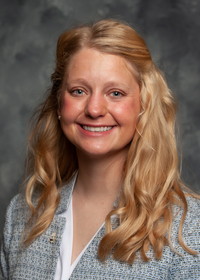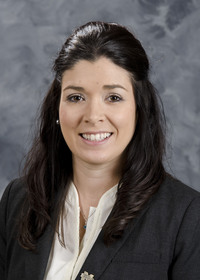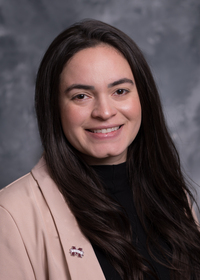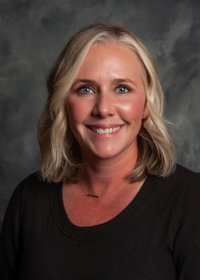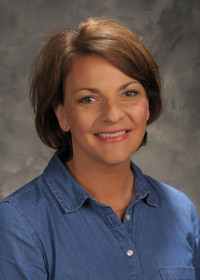Information Possibly Outdated
The information presented on this page was originally released on June 21, 2007. It may not be outdated, but please search our site for more current information. If you plan to quote or reference this information in a publication, please check with the Extension specialist or author before proceeding.
Extension interactive video links services to Mississippians
By Courtney Coufal
MSU Ag Communications
MISSISSIPPI STATE -- When Covington County cattleman Johnny Pope placed the top bid for a Hereford bull at a recent sale, he was almost 200 miles from the auction.
Pope is one of many animal buyers in the state taking advantage of the interactive video component added to the Mississippi Agricultural and Forestry Experiment Station's Annual Livestock Production Sale by the Mississippi State University Extension Service.
The annual sale is held at the Mississippi Horse Park in Starkville, but Pope placed his winning bid in Hattiesburg at the Forrest County Extension office, one of the remote bidding locations.
“Considering the length of the drive, I didn't want to take a chance to drive that far and come home without an animal,” Pope said. “It worked out really well, and it was really convenient for me to go to the remote bidding site to buy a bull.”
Pope, who lives in Collins, viewed the animals for sale by video, participated in the live auction by interactive video and placed bids by telephone with the help of Forrest County Extension agent Mike Keene. These same features were available at the Mississippi Beef Cattle Improvement Association Bull Sale in 2006 and an Agribition Bull Sale early this year.
Jane Parish, MSU Extension beef specialist, said the interactive video has allowed the sales to reach many people who otherwise would not attend because of the location and driving costs.
“The production sales are not geographically convenient to everyone in the state. We wanted to make sure that everyone interested in attending the sale could do so without having to drive the distance,” Parish said.
The MSU Extension Service offers a wide range of media capabilities through distance education. Like the production sales, many organizations have embraced the use of distance education to bridge the physical gap between student and instructor -- or in the case of the production sale, buyer and seller.
Susan Seal, distance education coordinator with the Extension Service, said their program focuses on the needs of the people and uses technology as a tool.
“We ask our educators to decide the best way to teach and interact with the participants regardless of the medium, and then we try to make that work with the tools we have,” Seal said. “We have access to an extensive interactive video network, Web-based programming, streaming video (live and archived), podcasting, and, of course, DVD and VHS.”
MSU Extension Service's distance education program has grown steadily since its beginning. Every county office in Mississippi is equipped with an interactive video system. In 2000, distance education hosted 13 videoconferences; by 2006, almost 700 videoconferences had been shown to and used by students, state specialists, state officials, consumers, producers, and organization members and officers across Mississippi.
When people first use distance education technologies, many are out of their comfort zone, Seal said. As they use it repeatedly and grow more comfortable with it, they discover more ways to use these resources.
“What our Extension agents have discovered is that with the added tools available through various distance learning media, they may actually be able to provide learning experiences that are not feasible through traditional methods,” Seal said. “An agent or specialist quite frequently will call and ask us if doing something outside the box is possible and we can usually find a way to make it work.”
Videoconferencing using stationary video equipment can be used in a traditional classroom setting and has become an accepted part of the education system. The MSU distance education professionals are adapting the technology to new environments.
“By using more portable systems, we also can adapt to situations that may take us outside the classroom to the environment that is best for the specific program,” Seal said.
The production bull sales as well as Freedom Calls and child-care training programs use interactive video in a portable form.
Freedom Calls is a program connecting military families with their loved ones stationed overseas. To date, six Freedom Calls have been held across Mississippi with family members located at a nearby Extension office. In February, Nikesia Willingham, who is stationed in Iraq, was reunited with her children and other family members via interactive video in DeSoto County.
“It makes me feel so good to see my kids and interact with my mom, auntie and sister. It means so much to be able to see how they've grown. Talking with them on the phone is just not the same as seeing them,” Willingham said via e-mail. “I wanted my kids to see me so they know Mom is still here, still thinks about them every day and will be coming home.”
Mississippi child-care workers are required to complete continuing education training each year. Karen Benson, area child and family development agent, has taught four training sessions from MSU's Aiken Preschool via a portable videoconferencing unit.
Beth Bell, child and family development area agent in Charleston, was at a remote location during the training.
“The child-care givers loved the training being broadcast from the child-care center,” Bell said. “The fact that it was done at a child-care center was great, too. I know that took extra work, but it was well worth it.”
The Mississippi Homemaker Volunteers take advantage of the traditional classroom setting with videoconferencing and have increased participation among their members by using this technology. They have held more than 20 videoconferences this year for board, committee and planning meetings.
“The MHV members really appreciate going to their local Extension office and being able to meet with MHV members all over the state,” said Marilyn Bailey, an Extension area leadership development agent in Biloxi. “We've been able to have better input planning the MHV State Council because we've met with the executive board four times this year instead of just once.”
Distance education media has become a vital communication tool for education, government agencies and private industries and will become more valuable in the future, Seal said.
“As we continue to find new applications for existing technologies, new technologies are developed, and technology savvy young people enter the educational system and the workforce, distance education will continue to be important in our outreach efforts,” she said.


